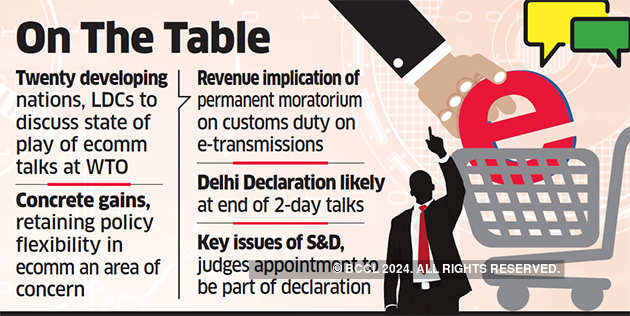E-commerce negotiations at the multilateral level will be a key area of talks at the informal World Trade Organization (WTO) ministerial meeting which will take place in Delhi later this month.
At the informal ministerial, at least 20 developing countries and least developed countries will discuss how realistic it is to assume that they can “effectively and meaningfully influence” the outcome of negotiations on free flow of data across borders, server localisation and source code disclosure.
“There will be a session on implications of joining the negotiations on e-commerce at the WTO where a lot of pertinent questions on digital trade would be raised,” an official told ET on condition of anonymity.
The participating countries will deliberate the concrete gains for them from negotiating binding rules on e-commerce and the revenue implications of a permanent moratorium on customs duty on electronic transmissions.
They will also debate the pros and cons of retaining policy flexibility to nurture their domestic digital firms or if they would be better off with binding rules.
In its draft National E-Commerce Policy, India has proposed regulating cross-border data flows, locating computing facilities within the country to ensure job creation and setting up a dedicated data authority for issues related to sharing of community data. It has stated that the data generated in the country is a national asset and citizens and the government have a sovereign right over it.

The Delhi ministerial meeting comes at a crucial time when a group of 76 countries including the United States, European Union nations, China, Japan and Australia have formed a plurilateral to develop trade rules on ecommerce, an idea that has been opposed by India and other developing countries.
India has argued that these discussions are not consistent with the mandate of the multilateral trading system and that these strike at its roots.
Although India is opposed to the plurilateral on e-commerce, it has told the WTO that it would pursue the existing multilateral work programme that prohibits countries from imposing customs duties on electronic transmissions, something that India and South Africa have questioned, citing revenue loss to developing countries.
The two-day discussions are likely to culminate in a Delhi Declaration on development and WTO reforms as the organisation’s director general, Roberto Azevêdo, would attend the meeting on May 13. “There could be a declaration at the end of the meeting,” said another official.
The declaration is expected to relate to critical issues including special and differential treatment for developing nations.
At the informal ministerial, at least 20 developing countries and least developed countries will discuss how realistic it is to assume that they can “effectively and meaningfully influence” the outcome of negotiations on free flow of data across borders, server localisation and source code disclosure.
“There will be a session on implications of joining the negotiations on e-commerce at the WTO where a lot of pertinent questions on digital trade would be raised,” an official told ET on condition of anonymity.
The participating countries will deliberate the concrete gains for them from negotiating binding rules on e-commerce and the revenue implications of a permanent moratorium on customs duty on electronic transmissions.
They will also debate the pros and cons of retaining policy flexibility to nurture their domestic digital firms or if they would be better off with binding rules.
In its draft National E-Commerce Policy, India has proposed regulating cross-border data flows, locating computing facilities within the country to ensure job creation and setting up a dedicated data authority for issues related to sharing of community data. It has stated that the data generated in the country is a national asset and citizens and the government have a sovereign right over it.

The Delhi ministerial meeting comes at a crucial time when a group of 76 countries including the United States, European Union nations, China, Japan and Australia have formed a plurilateral to develop trade rules on ecommerce, an idea that has been opposed by India and other developing countries.
India has argued that these discussions are not consistent with the mandate of the multilateral trading system and that these strike at its roots.
Although India is opposed to the plurilateral on e-commerce, it has told the WTO that it would pursue the existing multilateral work programme that prohibits countries from imposing customs duties on electronic transmissions, something that India and South Africa have questioned, citing revenue loss to developing countries.
The two-day discussions are likely to culminate in a Delhi Declaration on development and WTO reforms as the organisation’s director general, Roberto Azevêdo, would attend the meeting on May 13. “There could be a declaration at the end of the meeting,” said another official.
The declaration is expected to relate to critical issues including special and differential treatment for developing nations.
No comments:
Post a Comment